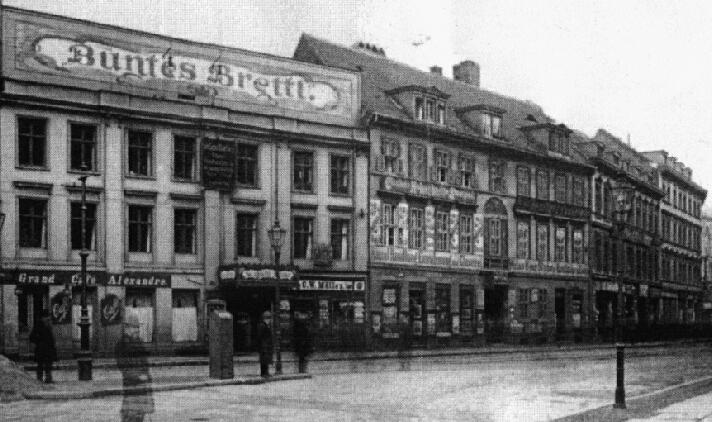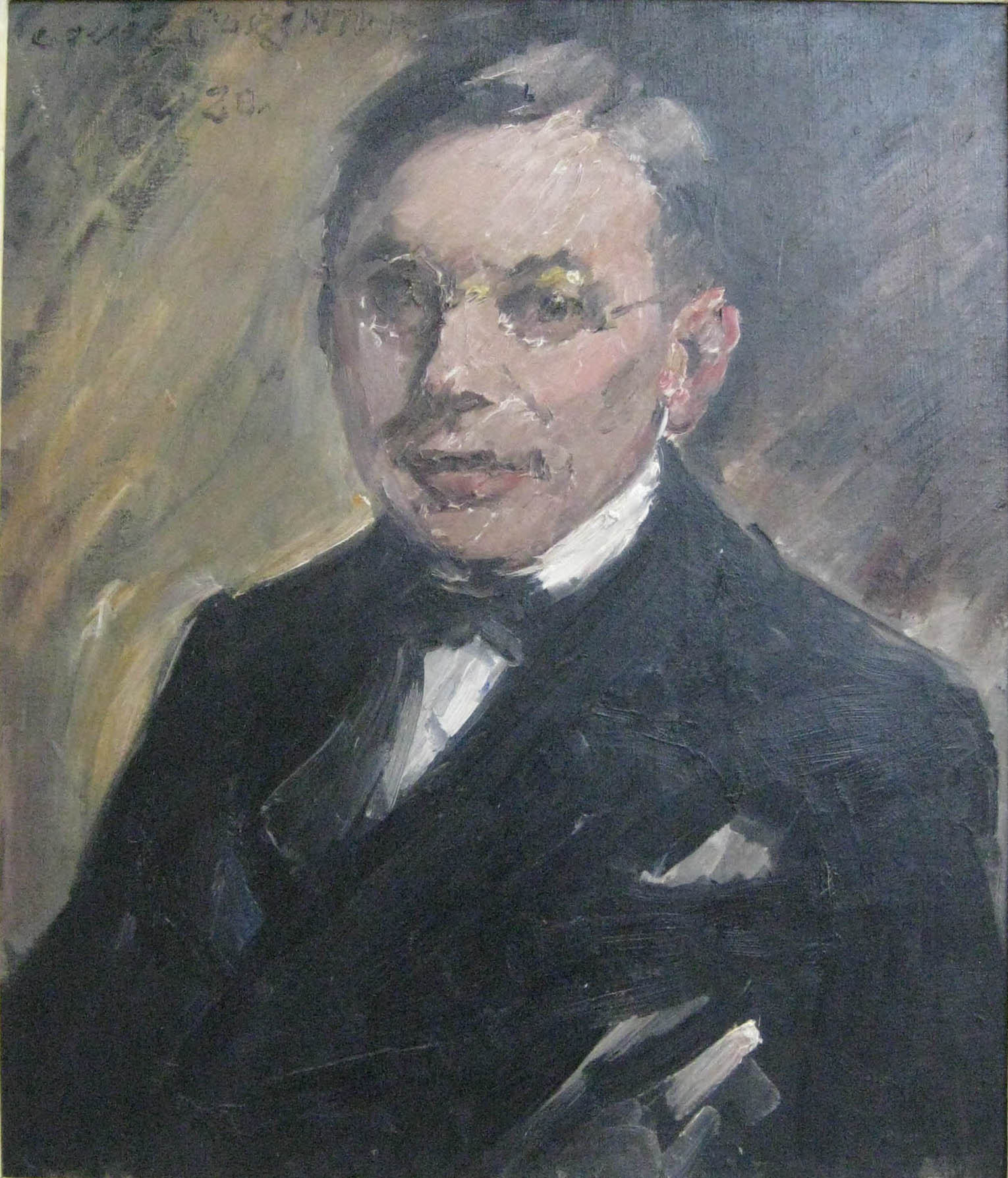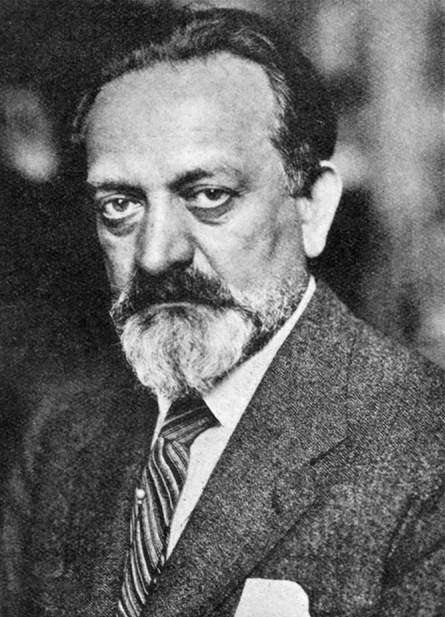|
Café Des Westens
The Café des Westens, on No.18/19 Kurfürstendamm in Berlin, was a coffeehouse which operated from 1898 to 1915, and became famous as a meeting place for turn of the century artists. It was known colloquially as ''Café Größenwahn''; the German ''Größenwahn'' meaning "delusions of grandeur". History The café opened in 1893 on the ground floor of a newly erected lavish residential building in Charlottenburg, part of the Wilhelmine Ring in the fashionable "New West" area next to the German capital. Then named ''Kleines Café'' ("Little Café"), it was one of the first coffee houses on Kurfürstendamm boulevard and soon became a popular venue for a literary circle around Maximilian Bern. Renamed ''Café des Westens'' in 1898, with new cuisine, it gained attractiveness even for artists from the historic city centre in present-day Berlin-Mitte. In 1904, the establishment was again enlarged, with a billiard room on the first floor. Over the years, several artist groups met here ... [...More Info...] [...Related Items...] OR: [Wikipedia] [Google] [Baidu] |
Überbrettl
Überbrettl ( ''super-cabaret'') was the first venue in Germany for literary cabaret, or Kabarett, founded 1901 in Berlin by Ernst von Wolzogen. The German Kabarett concept was imported from French venues like Le Chat Noir in Paris, from which it kept the characteristic atmosphere of intimacy. But the German type developed its own peculiarities, most prominently its characteristic gallows humour.(1997''The new encyclopaedia Britannica'' Volume 2, p.702 quote: History The distinct cabaret atmosphere was sketched by Otto Julius Bierbaum in his 1897 novel ''Stilpe'', which inspired Wolzogen in the foundation of the ''Überbrettl''. He chose the initial name both to parody Friedrich Nietzsche's ''Übermensch'' concept and to contrast the widespread ''Brettl'' (i.e. "(stage-)board") variety shows without further artistic ambitions. The venue opened in a former theatre on 18 January 1901 on Alexanderstraße No. 40, vis-à-vis the Alexanderplatz police headquarters. Victor Hollaender, ... [...More Info...] [...Related Items...] OR: [Wikipedia] [Google] [Baidu] |
Berlin Secession
The Berlin Secession was an art movement established in Germany on May 2, 1898. Formed in reaction to the Association of Berlin Artists, and the restrictions on contemporary art imposed by Kaiser Wilhelm II, 65 artists "seceded," demonstrating against the standards of academic or government-endorsed art. The movement is classified as a form of German Modernism, and came on the heels of several other secessions in Germany, including Jugendstil and the Munich Secession. History Rise and reign of the Secession The upheavals that led to the formation of the Berlin Secession began in 1891 on the occasion of the Great International Art Exhibition in Berlin. A dispute began after the commission of the Association of Berlin Artists rejected images done by Edvard Munch. In May 1898, under the leadership of Walter Leistikow, Franz Skarbina and Max Liebermann, various artists converged to form a "free association for the organization of artistic exhibitions". This group was governed ... [...More Info...] [...Related Items...] OR: [Wikipedia] [Google] [Baidu] |
Ernst Oppler
Ernst Oppler (19 September 1867 1 March 1929) was a German Impressionist painter and etcher born in Hanover. Early life Ernst Oppler was the son of Edwin Oppler (1831-1880), a prominent German-Jewish architect. Ernst Oppler's brothers were the sculptor Alexander Oppler (1869-1937), the physician (1871-1943), and the attorney and notary (1873-1942). His cousin was the designer (1875-1965). He studied at the Academy of Arts in Munich under Nikolaus Gysis and Ludwig von Löfftz. Afterwards he moved to London to study the work of James Abbott McNeill Whistler, one of his favorite artists. He became a member of the International Society of Sculptors, Painters and Gravers in 1898. His early work was naturalistic in approach. In 1901 he went to the Netherlands to practise the pleinair method, and painted elegant portraits of the gentry in subdued tones. Berlin Secession Back in Munich Oppler joined the Munich Secession. In 1904 Max Liebermann invited Ernst Oppler and Lovis ... [...More Info...] [...Related Items...] OR: [Wikipedia] [Google] [Baidu] |
Emil Orlík
Emil Orlik (21 July 1870 – 28 September 1932) was a painter, etcher and lithographer. He was born in Prague, which was at that time part of the Austro-Hungarian Empire, and lived and worked in Prague, Austria and Germany. Biography Emil Orlik was the son of a tailor. He first studied art at the private art school of Heinrich Knirr, where one of his fellow pupils was Paul Klee. From 1891, he studied at the Munich Academy under Wilhelm Lindenschmit. Later he learned engraving from Johann Leonhard Raab and proceeded to experiment with various printmaking processes. After performing his military service in Prague, he returned to Munich, where he worked for the magazine '' Jugend''. He spent most of 1898, travelling through Europe, visiting the Netherlands, Great Britain, Belgium, and Paris. During this time he became aware of Japanese art, and the impact it was having in Europe, and decided to visit Japan to learn woodcut techniques. He left for Asia in March 1900, stopping off in ... [...More Info...] [...Related Items...] OR: [Wikipedia] [Google] [Baidu] |
Carl Sternheim
Carl Sternheim (born William Adolph Carl Francke; 1 April 1878 – 3 November 1942) was a German playwright and short story writer. One of the major exponents of German Expressionism, he especially satirized the moral sensibilities of the emerging German middle class during the Wilhelmine period. Early life and education Sternheim was born in Leipzig, the son of Rosa Marie Flora (née Francke) (1856–1908) and Carl Julius Sternheim (1852–1918), a banker. His parents married two years after he was born. His father was Jewish and his mother was a Lutheran from a working-class family. Sternheim grew up in Hannover and Berlin. Between 1897 and 1902, he studied philosophy, psychology, and jurisprudence intermittently at the Universities of Munich, Göttingen, and Leipzig, but never graduated. Family and career In 1900, he began working as a freelance writer in Weimar, where he met and married his first wife Eugenie Hauth the same year. Their union ended in 1906 and he marr ... [...More Info...] [...Related Items...] OR: [Wikipedia] [Google] [Baidu] |
Frank Wedekind
Benjamin Franklin Wedekind (July 24, 1864 – March 9, 1918) was a German playwright. His work, which often criticizes bourgeois attitudes (particularly towards sex), is considered to anticipate expressionism and was influential in the development of epic theatre.See Banham (1998) and Willett (1959). In his '' Messingkauf Dialogues'', Brecht cites Wedekind, along with Büchner and Valentin, as his "chief influences" in his early years: "he", Brecht writes of himself in the third person, "also saw the writer ''Wedekind'' performing his own works in a style which he had developed in cabaret. Wedekind had worked as a ballad singer; he accompanied himself on the lute." (1965, 69). In the English-speaking world, before 2006 Wedekind was best known for the "Lulu" cycle, a two-play series—''Erdgeist'' (''Earth Spirit'', 1895) and '' Die Büchse der Pandora'' (''Pandora's Box'', 1904)—centered on a young dancer/adventuress of mysterious origin. In 2006 his earlier play '' Früh ... [...More Info...] [...Related Items...] OR: [Wikipedia] [Google] [Baidu] |
Paul Lindau
Paul Lindau (3 June 1839 – 31 January 1919) was a German dramatist and novelist. Life and Works Lindau was born in Magdeburg as the son of Carl Lindau, a lawyer (Justizkommissar) whose parents Hertz Levin (a physician) and Henriette Cohen had converted from Judaism to Protestantism. Hertz Levin changed his name to Hermann Lindau after conversion.Wilhelm, Gertraude, "Lindau, Paul" in: ''Neue Deutsche Biographie'' 14 (1985), p. 573-575Online version Paul was educated at Halle, Leipzig, and Berlin. He spent five years in Paris to further his studies, acting meanwhile as foreign correspondent to German papers. After his return to Germany in 1863 he was engaged in journalism in Düsseldorf and Elberfeld. In 1870 he founded ''Das neue Blatt'' at Leipzig; from 1872 to 1881 he edited the Berlin weekly '; and in 1878 he founded the well-known monthly ''Nord und Süd'', which he continued to edit until 1904. Two books of travel, ''Aus Venetien'' (Düsseldorf, 1864) and ''Aus Paris'' ( ... [...More Info...] [...Related Items...] OR: [Wikipedia] [Google] [Baidu] |
Ludwig Fulda
Ludwig Anton Salomon Fulda (July 7, 1862 – March 7, 1939) was a German playwright and poet, with a strong social commitment. He lived with Moritz Moszkowski's first wife Henriette, née Chaminade, younger sister of pianist and composer Cécile Chaminade.Lazaros C. TriarhouMoritz Moszkowski'' Vol. 67 No. 6 (2012), European Neurology. Accessdate: 10 June 2012'' Biography He was born in Frankfurt. He was a member of the Prussian Academy of Arts and the first president of the PEN of Germany (1925–1932). He visited the United States in 1906 on the invitation of the Germanistic Society. A Jew, he was removed from his work by the Nazis in 1933. Fulda committed suicide in Berlin in 1939 when he was denied entry into the United States. Works Fulda's creations used the relationships of his characters to develop the social and political issues of his time. Fulda's works include ''Das verlorene Paradies'' (1892; translated as ''The Lost Paradise'', 1897), ''Der Talisman'' (1892), '' ... [...More Info...] [...Related Items...] OR: [Wikipedia] [Google] [Baidu] |
Maximilian Harden
__NOTOC__ Maximilian Harden (born Felix Ernst Witkowski, 20 October 1861 – 30 October 1927) was an influential German journalist and editor. Biography Born the son of a Jewish merchant in Berlin he attended the '' Französisches Gymnasium'' until he began to train as an actor and joined a traveling theatre troupe. In 1878 Harden converted to Protestantism and started his journalistic career as a theatre critic in 1884. He also published political essays under the pseudonym ''Apostata'' in several liberal newspapers like the ''Berliner Tageblatt'' edited by Rudolf Mosse. From 1892 Harden published the journal '' Die Zukunft'' (''The Future'') in Berlin. His baroque style was mocked by former friend Karl Kraus, who wrote a satire about "translations from Harden". Initially a monarchist, Harden became a fierce critic of Kaiser Wilhelm II and his entourage including Philipp, Prince of Eulenburg, and General Kuno von Moltke. His public accusations of homosexual behaviour – a ... [...More Info...] [...Related Items...] OR: [Wikipedia] [Google] [Baidu] |
Richard Strauss
Richard Georg Strauss (; 11 June 1864 – 8 September 1949) was a German composer, conductor, pianist, and violinist. Considered a leading composer of the late Romantic music, Romantic and early Modernism (music), modern eras, he has been described as a successor of Richard Wagner and Franz Liszt. Along with Gustav Mahler, he represents the late flowering of German Romanticism, in which pioneering subtleties of orchestration are combined with an advanced harmony, harmonic style. Strauss's compositional output began in 1870 when he was just six years old and lasted until his death nearly eighty years later. While his output of works encompasses nearly every type of classical compositional form, Strauss achieved his greatest success with tone poems and operas. His first tone poem to achieve wide acclaim was ''Don Juan (Strauss), Don Juan'', and this was followed by other lauded works of this kind, including ''Death and Transfiguration'', ''Till Eulenspiegel's Merry Pranks'', ''Als ... [...More Info...] [...Related Items...] OR: [Wikipedia] [Google] [Baidu] |
Bohemianism
Bohemianism is the practice of an unconventional lifestyle, often in the company of like-minded people and with few permanent ties. It involves musical, artistic, literary, or spiritual pursuits. In this context, bohemians may be wanderers, adventurers, or vagabonds. Bohemian is a 19th-century historical and literary topos that places the milieu of young metropolitan artists and intellectuals—particularly those of the Latin Quarter in Paris—in a context of poverty, hunger, appreciation of friendship, idealization of art and contempt for money. Based on this topos, the most diverse real-world subcultures are often referred to as "bohemian" in a figurative sense, especially (but by no means exclusively) if they show traits of a precariat. This use of the word in the English language was imported from French ''La bohème'' in the mid-19th century and was used to describe the non-traditional lifestyles of artists, writers, journalists, musicians, and actors in major Europea ... [...More Info...] [...Related Items...] OR: [Wikipedia] [Google] [Baidu] |








.jpg)